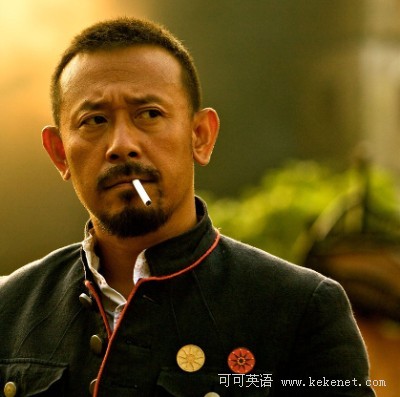
Jiang Wen is at the top of the world - the world of Chinese cinema, that is. His year-end release Let the Bullets Fly has just broken the box-office record for a domestic film with some 700 million yuan ($107 million) in gross receipts.
姜文登上了中國電影界的巔峰。2010年末上映的電影《讓子彈飛》國內(nèi)總票房收入高達(dá)7億元(合1.07億美元),締造了中國電影史票房新紀(jì)錄。
He does not need others to tell him how great he is - not any more.
他不再需要別人來告訴自己有多出色了。
That does not mean he is not proud of Bullets. It`s just that Bullets, for him, is fun. He is aware of all the political interpretations of his story that have sprung up across the Web and mainstream media.
但這并不意味著他不為《讓子彈飛》而感到驕傲。對于他來說,創(chuàng)作這部電影是為了好玩。他明白,各種關(guān)于《讓子彈飛》的政治解讀已在網(wǎng)絡(luò)和主流媒體上傳得沸沸揚(yáng)揚(yáng)。
"No, I did not mean to embed political meanings into the story," he says straightforwardly.
他直截了當(dāng)?shù)卣f:“不,我沒有刻意在電影里摻雜政治觀點。”
The Goose Town, the central setting for the movie, has come to symbolize China for some film buffs with a political leaning. Yet, Jiang repeatedly uses the location as an outing to the murky world of genre-film making.
故事發(fā)生在“鵝城”,一些帶有政治傾向的電影愛好者認(rèn)為“鵝城”象征著中國。然而在電影里,姜文屢次地把這個地方比作深入險境。
The most brilliant touches in his movies all seem to traverse the stream of reality, for example, in Bullets opens with a train pulled by white horses.
電影中最出彩的片段似乎都與現(xiàn)實相關(guān),比如電影開篇的白馬拉火車。
"I did not invent this set-up. For 30 years in the early 20th century, there was a segment of rail line in Northeast China that was powered by horses," he explains, without getting into the symbolic significance of such devices. "You may conceive the most unlikely scenes, and you`ll find that fact is stranger than fiction."
他解釋道:“這個場景不是我憑空想象的。20世紀(jì)頭30年,中國東北有一段鐵路就是靠馬拉火車。”這些場景并沒有暗指什么。“你設(shè)想出了最荒誕的場景,接著你會發(fā)現(xiàn),事實比電影情節(jié)更不可思議。”











